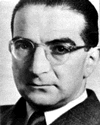
Rudolf
Kasztner
THE
KASTNER TRIAL - shown at the Jewish Film Festival in
1997
Czech
film about Rabbi Weissmandel: Among Blind
Fools
Simon
Wiesenthal Centre
Shamash:
The
Jewish Internet Consortium: Holocaust Home
Page
The
Confession of Adolf Eichmann
Revolt
of Warsaw's Jews
Jews
not Zionists website
Purchase
Pefidy by Ben Hecht
The
Holocaust/O Porrajmos
Roma
and the Holocaust
|
Here is the
minority judgement of Supreme Court Judge Moshe Silberg in
1957:
I do not say
that he was the only man who possessed information among
the leaders. It is quite possible that somebody else as
well does not have a clear conscience with regards to
this concealment. But we are dealing here with the guilt
of Kastner and we do not have to make judgements on the
guilt of others . . . The declaration of the learned
Attorney General therefore shrinks into an opinion . . .
'Kastner was convinced and believed that there was no ray
of hope for the Jews of Hungary, almost for none of them,
and as he, as a result of his personal despair, did not
disclose the secret of the extermination in order not to
endanger or frustrate the rescue of the few - therefore
he acted in good faith and should not be accused of
collaborating with the Nazis in expediting the
extermination of the Jews, even though, in fact, he
brought about its result.'
I am compelled to state
that it is very difficult for me to conceive such an
intention. Is this good faith? Can a single man, even in
cooperation with some of his friends, yield to despair on
behalf and without the knowledge of 800,000 other people?
This is, in my opinion, the decisive consideration in the
problem facing us.
The charge emanating
from the testimony of the witnesses against Kastner is
that had they known of the Auschwitz secret, then
thousands or tens of thousands would have been able to
save their lives by local, partial, specific or indirect
rescue operations like local revolts, resistance,
escapes, hidings, concealment of children with Gentiles,
forging of documents, ransom money, bribery, etc. - and
when this is the case and when one deals with many
hundreds of thousands, how does a human being, a mortal,
reject with complete certainty and with an extreme 'no'
the efficiency of all the many and varied rescue ways?
How can he examine the tens of thousands of
possibilities? Does he decide instead of God? Indeed, he
who can act with such a usurpation of the last hope of
hundreds of thousands is not entitled to claim good faith
as his defense. The penetrating question quo warrento is
a good answer to a claim of such good faith . . .
If the superintendent of
a big hospital lets thousands of sick people die so that
he may devote himself to the sure rescue of one soul, he
will come out guilty, at least morally, even if it is
proven that he as an individual erroneously thought that
there was no hope of saving the other patients. He is a
collaborator with the angel of death. Either a complete
atrophy of the soul or a blind involvement with complete
loss of senses and proportion in his small but personal
rescue operation could bring a man to such a gigantic,
hazardous play.
And if all this is not
enough to annul the claim of good faith which was put
before us on behalf of Kastner by the Attorney General,
then Kastner himself comes and annuls it altogether. Not
only did he never make this claim, but his own words
prove the contrary. He writes in his report to the Jewish
Agency that the Committee sent emissaries to many ghettos
in the countryside and pleaded with them to organize
escapes and to refuse to board the trains. And though the
story of these pleadings is untrue, and the silence of
Kastner in Kluj is proven, the very uttering of these
statements entirely contradicts the claim that Kastner
had concealed the news about the fate of the ghetto
inmates in good faith and only as a result of his
complete despairing of the chances of escaping or
resisting the Germans. You can not claim at the same time
helplessness and activity. Anyway, such a claim is not
convincing . . .
We can sum up with three
facts:
A. That the Nazis didn't
want to have a great revolt - 'Second Warsaw' - nor small
revolts, and their passion was to have the extermination
machine working smoothly without resistance. This fact
was known to Kastner from the best source - from Eichmann
himself - And he had additional proofs of that when he
witnessed all the illusionary and misleading tactics
which were being taken by the Nazis from the first moment
of occupation.
B. That the most
efficient means to paralyze the resistance with - or the
escape of a victim is to conceal from him the plot of the
coming murder. This fact is known to every man and one
does not need any proof of evidence for
this.
C. That he, Kastner, in
order to carry out the rescue plan for the few
prominents, fulfilled knowingly and without good faith
the said desire of the Nazis, thus expediting the work of
exterminating the masses.
And also the rescue of
Becher by Kastner . . . He who is capable of rescuing
this Becher from hanging proves that the atrocities of
this great war criminal were not so horrifying or
despicable in his eyes . . . I couldn't base the main
guilt of Kastner on this fact had it been alone, but when
it is attached even from afar to the whole scene of
events it throws retroactive light on the whole affair
and serves as a dozen proofs of our
conclusion."
|
